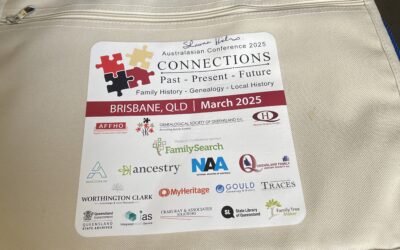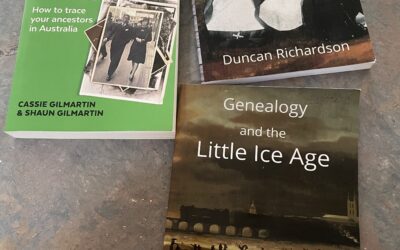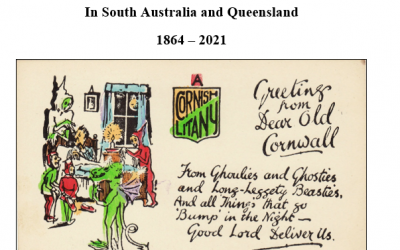Can you do genealogy without using technology today is a question that I have been mulling over for some time. In just about every talk I do, there are at least one or more people who claim not to use a computer, quite a few that don’t use mailing lists, most don’t read blogs or use Twitter, although Facebook seems to have a following.
On my recent genealogy trip to New Zealand, instead of going through the process of setting my mobile phone to international and carting my laptop around with me, I decided to go technology free for the ten days. After all, how long can ten days be? My partner agreed too so we were without a GPS, mobile phones, computer, internet, email and every other online social media. We even went without TV but I did buy the occasional newspaper.
How did we do? Not that great and it was an interesting experiment but one that I don’t think we will do again in a hurry.
First, driving in a foreign city without a GPS and only tourist maps is a big time waster. We had quite a trip to the Auckland Office of Archives New Zealand even though we had a simplified map of where it was. Thankfully taxi drivers and real estate people don’t mind giving Aussie tourists directions – they even seemed to think it was funny. Once at the Archives I discovered they had what I think was a Dos based ordering system but it is so long since I have used Dos I am not sure. Certainly I needed help to place my orders.
While waiting for my records, I browsed their card indexes (would be so good if they were online) and discovered other printed indexes in ring binders (obviously from databases which aren’t searchable on computer in the reading room for some reason and again would be terrific online). I found lots of information on families I was looking for, ordered some photocopies which will be posted to me so it was worth the trip out to the Auckland Office – but why are archives always so far out of the city?
In contrast, our visit to Auckland City Libraries was a short stroll from our CBD hotel and what an amazing place. As we went up the two flights of escalators to the Auckland Research Centre, I had trouble believing I was in a library. Even more amazing was that there were three helpful staff on duty (on a Sunday) while we were there which is just as well as I had forgotten what it was like to use a microfilm machine although I could handle the fiche reader. It was a good reminder that not all newspapers are on New Zealand’s Papers Past and not everything is digitised.
It was also good to be able to browse the shelves and see a lot of the genealogy resources (some of which I had forgotten about – out of sight out of mind) and it is the serendipity aspect of choosing books at random that I miss when comparing online research to physically visiting a library. You also miss any helpful advice and suggestions from the knowledgeable staff. The Centre also has some card indexes not yet online and we spent some time looking through them. Another successful visit in person rather than online but online is far easier but you have to remember that not everything is online.
After Auckland we went to visit friends and due to a miscommunication we ended up in the wrong place, in a remote part of New Zealand, on a dangerous dirt road after dark in the freezing cold wondering if it was possible to freeze to death in a car. The whole situation would have been avoided if we had mobile phones with us – we had earlier tried to find a public phone but there don’t seem to be that many of them left and when we did, it only took phone cards and we had coins. We pressed on and stopped at a chemist who directed us up the dirt road after she had let us make one phone call, had she let us make two as we wanted we would not have got lost. Anyway cutting a long story short, we were found, given hot drinks and food, and sent on the right road to our friend’s place.
No mobile phone was also a problem for us at the New Zealand Family History Fair as we could not simply text each other to say where/when we would meet or whatever. Having to walk back to the room to see if my partner was back or not was time wasting and frustrating if he wasn’t there or tracking him to the pool, gym or sauna. And vice versa for him I should add in fairness.
Not having the laptop with us meant that we couldn’t access emails, Facebook, Twitter or anything. I had no idea what was happening with new genealogy information (funny I hadn’t realised I had a Dick Eastman addiction until New Zealand, I knew about my Twitter one but not Eastman). I couldn’t email or put on Facebook my exciting genealogy finds to let family and friends know how the trip was going. I was missing Twitter and my online friends and couldn’t read all my favourite blogs.
Being without a mobile phone or email is also a worry if something goes wrong back home. Despite my mother telling me she would be ok for the ten days, she was admitted to hospital just four days after we left. My brother left updates on our mobile phones but of course we couldn’t access them until we got back to Melbourne. Same for his email updates. Also a timely reminder that we should give at least one contact point when visiting overseas even if we are travelling around.
Is there a plus side to living without technology? The only positive was that I seemed to sleep more – no late night sessions on the computer, no getting up early to check emails, Twitter and read blogs.
In summary, you really do need GPS to help you get to archives and libraries easily when travelling (if you are driving or hire cars should include street directories, not just tourist maps), you do need mobile phones for easier and timely communication, you need email access for both family and research needs, and Internet access is essential for doing background research on where you are going and doing homework before visiting archives and libraries. You could possibly get by without Twitter and blogs but then you miss up to date information, ground breaking genealogy news and so on.
Yes you can do genealogy without technology but why torture yourself?





Shauna,
Enjoyed the stories. For much of the work in GB, at least before 1837 at any rate, we still have to view the old registers, and not all are transcribed to film either!
But I particularly enjoyed you tales of navigating without GPS. My pal and I have for years travelled over much of Europe using old fashioned paper, and whilst we had some interesting/enjoyable unintentional excursions I still think it is the best way to go.
BTW I always cut myself off from the real world when on holiday, otherwise it doesn’t feel like a break.
Thanks again for the laughs!
Shauna, I can’t travel without a netbook and smartphone and get really twitchy on days at sea (where internet costs are exhorbitant) when I am cut off from society. I’ve bought GPS maps for overseas and either take my GPS or borrow a GPS from Mr Hertz or Mr Avis – it saves lots of marital stress.
As for research – you can do genealogy without technology and you can also do genealogy with only technology. Solely using either of these means could be detrimental to the progress of one’s research.
I believe that harnessing all resources available is the best way to go. In any area of endeavour one should make use of all resources available and select the most appropriate for the task at hand. Ignoring a whole set of resources because of bias or format phobia could lead to poor results.
Hi Shauna
Sounds like you need a hug from the tech withdrawal. I have often debated to take or not to take every time I travel, decided NO WAY. So am looking for a good mobile internet service while I am at the Gold Coast and travelling around NSW this August. Can you recommend any???
Hi Michelle
Within Australia I use the Telstra network as it has best coverage across the country. Thanks for your comments.
Shauna
Hi Shauna,
You were very brave. I can’t do without technology for too long at all! I need my cellphone, and I need access to the internet from somewhere. I have done it, but kind of feel cut off and lost from the outside world.
While you were “off the net” I really missed you on Twitter, although I was really chuffed to meet you in person.
Course libraries like ours are digitising more and more as funding becomes available. We have quite a few of our card indexes and resources digitised and online; but you are quite right in that we still have loads left to do.
The Grey Collection (our Special Collections) was closed when you visited, and that has loads of treasures that may interest you (NZ and Aus). Its open Monday to Friday, and I could arrange a tour of its resources next time you visit if you like?
Looking forward to seeing you again
Kind regards SEONAID
Interesting. Of course, there are several of us who started out doing genealogy without technology. I’m sure we could adapt better than others. Whenever I travel, I never drive but use public transportation and therefore never get lost. So, I never need a GPS. (I don’t have one anyway). As for the other things, I’ve never traveled abroad with a cell phone or a laptop. However, the last time abroad, there were Internet cafes for the first time, so I did check my email. It’s funny how we have adapted our lives to be constantly in touch with everything. It isn’t that long ago (25 years) that I studied in Europe knowing that I couldn’t come home if something tragic happened.
In any case, I’m sure that if I was going to do an international genealogical trip, I would just need my iphone since all my genealogy is on that.
Thanks Martin for commenting – I have been looking at the iphone – it seems a simple solution.
We sure did need GPS when we were in Melbourne to find the Archives, but I programmed it wrong and ended up in Sunshine.
I guess your experience is a warning to me never to be without technology if I can help it.